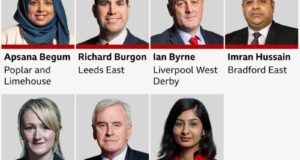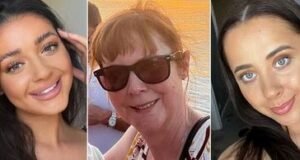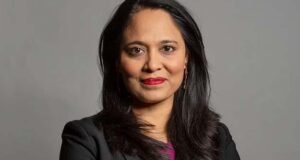
Two days after the death of his mother elevated him to the throne, King Charles III was officially proclaimed Britain’s monarch Saturday, in a pomp-filled ceremony steeped in ancient tradition and political symbolism — and, for the first time, broadcast live.
Charles, who spent seven decades as heir apparent, automatically became king when his mother, Queen Elizabeth II, died on Thursday. But the accession ceremony was a key constitutional and ceremonial step in introducing the new monarch to the country, a relic of a time before mass communications.
The King himself was not present for the first part of the meeting when he was proclaimed monarch by the Accession Council, made up of senior politicians, judges, and officials.
Clerk of the Privy Council Richard Tilbrook proclaimed Charles “King, head of the Commonwealth, defender of the faith”, before declaring “God Save the King”.
Paying tribute to the Queen at the throne room of St James’s before the assembled Accession Council shortly after 10.20am, the King also approved an order that the day of the Queen’s funeral will be a bank holiday.
Making his declaration, Charles III said: ‘My lords, ladies and gentlemen, it is my most sorrowful duty to announce to you the death of my beloved mother the Queen. I know how deeply you, the entire nation, and I think I may say the whole world, sympathise with me in the irreparable loss we’ve all suffered.
‘It is the greatest consolation to me to know the sympathy expressed by so many to my sister and brothers. And that such overwhelming affection and support should be extended to our whole family in our loss.’
After his personal declaration about the death of his mother the King took the oath to preserve the Church of Scotland – because in Scotland there is a division of powers between the church and state.
At St James’s shortly after 10.20am, Charles III made a personal declaration on the death of his beloved mother Queen Elizabeth II today and vowed to uphold ‘constitutional government and to seek the peace, harmony and prosperity of the peoples of these islands, and of the Commonwealth realms and territories throughout the world’.
Scores of senior politicians past and present, including Prime Minister Liz Truss and five of her predecessors, gathered in the ornate state apartments at St. James’s Palace for the meeting of the Accession Council, AP reports.
They met without Charles, officially confirming his title, King Charles III. The king then joined them, vowing to follow his mother’s “inspiring example” as he took on the duties of monarch.
“I am deeply aware of this great inheritance and of the duties and heavy responsibilities of sovereignty which have now passed to me,” he said.
Speaking of his personal grief, he said: “I know how deeply you and the entire nation, and I think I may say the whole world, sympathize with me in this irreparable loss we have all suffered.”
The new king also named his elder son and heir Prince William, 40, as the new Prince of Wales, while expressing love for his younger son Harry and daughter-in-law Meghan.
The move means William’s wife Kate assumes the Princess of Wales title once held by his mother and Charles’ ex-wife, the late Princess Diana.
The new king formally approved a series of orders — including one declaring the day of his mother’s funeral a public holiday. The date of the state funeral has not been announced, but it is expected to be around Sept 19.
This is the first time the accession ceremony has been held since 1952, when Queen Elizabeth II took the throne.
Charles was accompanied at the ceremony by his wife Camilla, the Queen Consort, and his eldest son Prince William. William is now heir to the throne and known by the title Charles long held, Prince of Wales.
The ceremony ended with a royal official publicly proclaiming King Charles III the monarch from a balcony at the palace. In centuries past, this would have been the first official confirmation the public had of their new sovereign.
David White, the Garter King of Arms, made the proclamation flanked by trumpeters in gold-trimmed robes before leading cheers — “hip, hip, hooray!” — for the new king.
Gun salutes rang out in Hyde Park, at the Tower of London and at military sites around the U.K. as he announced the news, and scarlet-robed soldiers in the palace courtyard doffed their bearskin hats in a royal salute.
The proclamation was read out in the medieval City of London and at other locations across the U.K.
Two days after the 96-year-old queen died at Balmoral Castle in Scotland following an unprecedented 70 years on the throne, people still came in their thousands to pay their respects outside Buckingham Palace in London. The scene was repeated at other royal residences across the U.K. and at British embassies around the world.
 Weekly Bangla Mirror | Bangla Mirror, Bangladeshi news in UK, bangla mirror news
Weekly Bangla Mirror | Bangla Mirror, Bangladeshi news in UK, bangla mirror news







